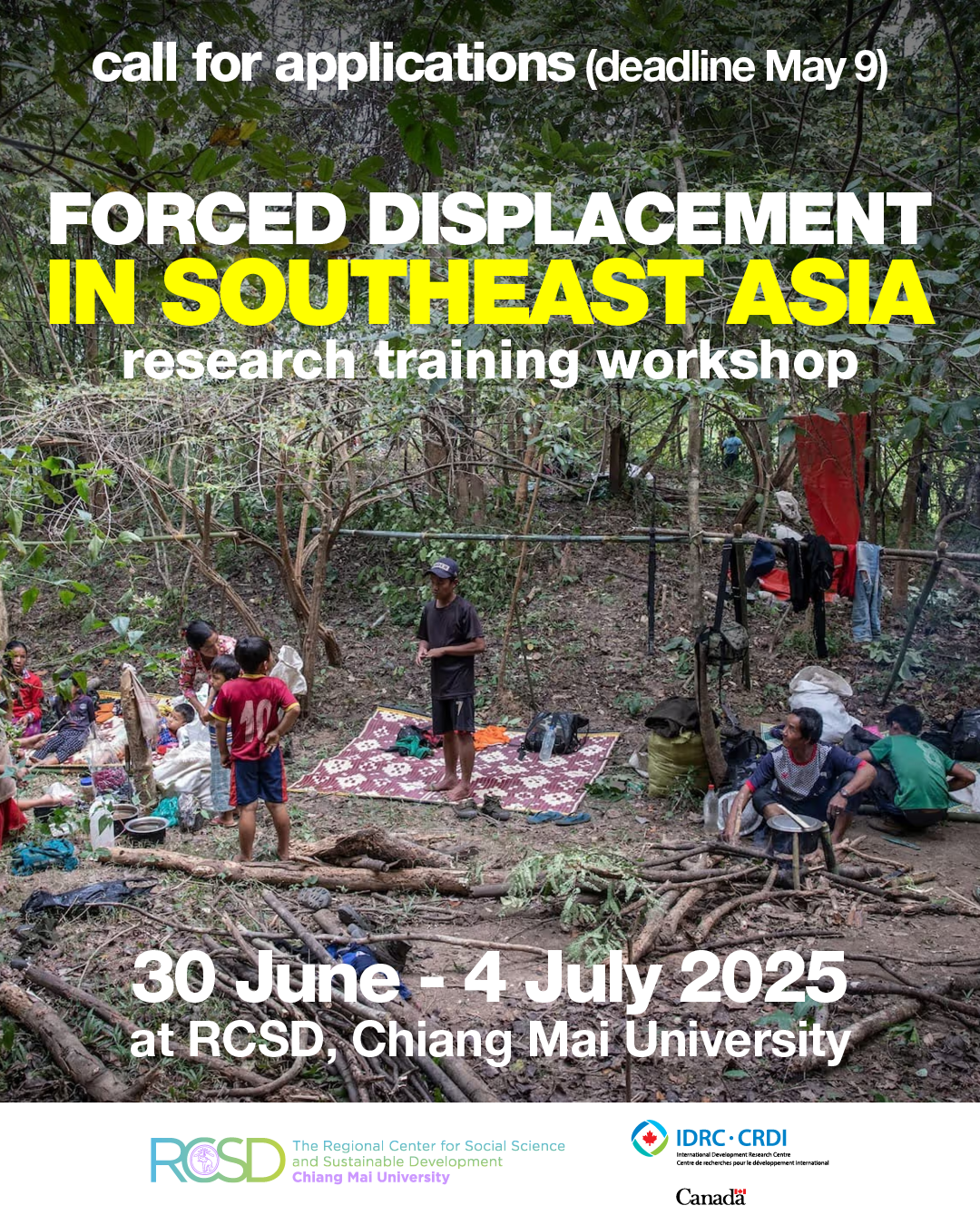Date: June 30 – July 4, 2025
Application Deadline: May 9, 2025
Forced displacement in Southeast Asia has reached critical levels, driven by three primary factors: armed conflict, climate disasters, and development projects. As of 2025, Myanmar hosts 3.5 million internally displaced persons (IDPs) due to prolonged civil conflict and military operations (UNOCHA, 2024). Meanwhile, the Philippines recorded over 5.7 million disaster-induced displacements in 2021 alone, primarily from typhoons (Source: Othering & Belonging Institute at UC Berkeley), while some areas in Vietnam and Indonesia are planned to relocate due to recurring floods and storms (Soo-Chen and McKoy, 2023). Moreover, large-scale dam projects like Laos’ Xayaburi Dam leave resettled communities struggling due to inadequate farmland and water access (Radio Free Asia, 2021), while the proposed Sanakham Dam threatens to displace over 62,500 people across both countries (Business & Human Rights Resource Center, 2024). In Cambodia, the Lower Sesan 2 Dam displaced over 5,000 indigenous people (Fair Finance Asia, 2024; Manalansan, 2024), with new projects like the Lower Srepok 3 risking further displacements in protected areas (Soriththeavy, 2024). Both countries face recurring issues of insufficient compensation and disrupted livelihoods tied to rivers and forests (Fair Finance Asia, 2024; Soriththeavy, 2024).
All forms and sizes of forced displacement generally have a significant social, political, and economic impact on communities, individuals, and countries. While forced displacement can affect both majority and minority populations, marginalized communities often bear a disproportionate burden of its consequences. Despite the significant social, political, and economic ramifications of displacement throughout the region, these issues remain largely understudied in the context of Southeast Asia. Therefore, the Regional Center for Social Science and Sustainable Development (RCSD), Faculty of Social Sciences, Chiang Mai University, cordially invites young and mid-career researchers, practitioners, and graduate students who are nationals of Southeast Asian countries to participate in a collaborative
workshop examining forced displacement issues in Southeast Asian countries.
The workshop is structured around three core components designed to advance scholarly engagement with forced displacement in Southeast Asia. First, it facilitates a critical analysis of prevailing disciplinary approaches with leading regional scholars, examining heterogeneous drivers including conflict-induced displacement, state-society-induced displacement, and forced displacement in the context of environmental justice, and institutional responses to displacement crises. Second, the workshop conducts rigorous analysis of regional case studies to evaluate policy frameworks, humanitarian interventions, and community-led strategies addressing displacement challenges across ASEAN nations.
Third, participants engage in methodological skill-building sessions focused on research
design, data collection ethics in vulnerable populations, and the development of paper
proposals through structured peer-review processes. By the end of the workshop, the
participants are expected to have proposed paper outlines.
After the workshop, participants have five months to conduct research and write the paper. Participants are ultimately required to write a 5,000-word analytical paper on a chosen forced displacement topic or issue in Southeast Asia. The RCSD will eventually release an edited volume titled “Researching Forced Displacement Issues in Southeast Asia”, which is composed of 10-15 papers edited by the RCSD.
This workshop targets around 10-15 young scholars and researchers from Southeast Asian countries who are passionate about learning and conducting research on forced displacement issues and may have lived experience of displacement in the past and are experiencing it now.
Eligible applicants should:
- Nationals of Southeast Asian countries;
- Have experience in research and writing papers;
- Have prior experience working in forced displacement, as well as forced migration issues in Southeast Asia
Application Requirements
- Applicant’s CV
- One-page Motivation Letter, answering:
- Why are you interested in this workshop?
- How does your participation in the workshop enhance your current academic studies or professional work?
- 300-Words Abstract of your proposed research paper on forced displacement issues
- A writing sample (chapter, article, proceedings, or research report)
Selection Procedures
Application Timeline April 01, 2025 – May 09, 2025
Shortlisted Applicants By May 23, 2025
Online Interviews May 26 -30, 2025
Result Announcement June 06, 2025
Funding support
RCSD will provide meals and refreshments during the workshop. For those living outside Chiang Mai, minimum funding support will cover accommodation and travel expenses to Chiang Mai.
Submit your application here

